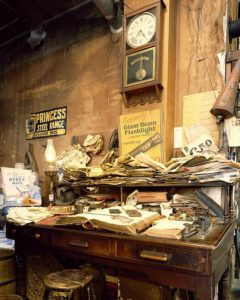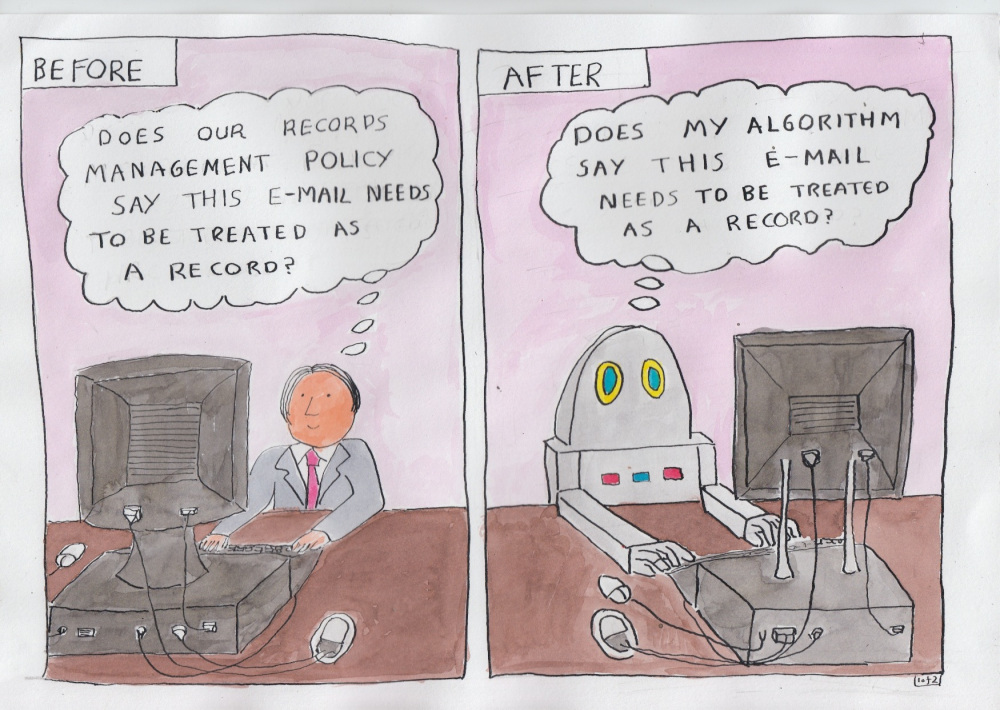
Credit: Highsmith, Carol M., “Cluttered desk at the historic Harrison Brothers Hardware Store, Huntsville, Alabama,” Library of Congress Prints and Photographs Division, Washington, D.C. 20540, http://hdl.loc.gov/loc.pnp/highsm.16835
I know what you’re thinking…how could the combination of cleaning off your desk, cleaning out your inbox, and managing records be fun? Well, I’m here to tell you!
Spring cleaning is not just for straightening up your house – it can be for the office, too! And it doesn’t have to be done in the spring! The month of January is a busy month where “spring” cleaning of your office records are concerned.
January 9, 2017, is National Clean Off Your Desk Day, and January 23-27, 2017, is National Clean Out Your Inbox Week. Now, you may think these days are solely about being able to see the surface of your desk again and not having thousands of emails bulking up your Outlook account. However, they also provide a wonderful opportunity for records management and archives professionals to talk about the importance of managing records and archives.
What is “records management”? The Society of American Archivists defines it in its glossary as “the systematic and administrative control of records throughout their life cycle to ensure efficiency and economy in their creation, use, handling, control, maintenance, and disposition.” All records have a life cycle that ends with either the record’s destruction or the record’s transfer to an institutional archives.
Records management can be overwhelming. Thankfully, UT Southwestern’s Materials Management Department, who manage administrative records retention on campus, has some helpful resources to which we can refer. The Open Drawer newsletter provides essential information about how to manage your UT Southwestern administrative records, including email. The June 2015 issue is especially relevant to this month’s “National Clean Off Your Desk Day”, as it provides useful hints on how to analyze the records you have to help you dispose of them and organize them into a filing system that allows you to efficiently and effectively locate records. As the newsletter notes: “Regularly decluttering unnecessary papers will pay off in time savings the next time you are searching for a document.”
April 2015’s Open Drawer speaks right to “National Clean Out Your Inbox Week” as the entire issue is dedicated to email management. UT Southwestern employees will also find that reviewing the resources linked from the Records Retention webpage on the Intranet and the Records Retention Schedule will be helpful in guiding them to make decision about the records they have created and how long they need to be retained.
Regarding email management, the Texas State Library and Archives Commission’s The Texas Record blog has several posts UT Southwestern employees may find informative at the following link: https://www.tsl.texas.gov/slrm/blog/tag/email/. One post of especial relevance to “National Clean Out Your Inbox Week” is the FAQ on how to set up an email filing system. And no blog post discussing records management would be complete without a records management comic:

Credit: Lappin, James, “Automated Records Management,” Thinking Records blog, https://thinkingrecords.co.uk/2013/09/24/automated-records-management/
So what does all this talk about managing the records on your physical and virtual desktop have to do with archives, you ask? Isn’t this just records management, plain and simple? Well, that is the magic of records management – it is uniquely tied to the goals of archives management! An effective records management program results in an effective archives management program because you have ensured that records of temporary value are disposed of when their designated retention period ends while records of permanent, historical value to the university are preserved and maintained so that they may be accessed far into the future. This is why records retention schedules are so important and abiding by them cannot be stressed enough: they are the roadmap that ensures that temporary records are destroyed when needed while permanent records are transferred and preserved in the archives. Ensuring that the records of long-term, historical value are maintained in an institution’s archives is a necessary component to that institution being able to tell its story to future generations.
Need more help getting advice about clearing your desk off? For records management related questions, you can find contact information on the Intranet’s Records Retention page. Curious to learn more about UT Southwestern’s archives? Email us at archives@southwestern.edu.
